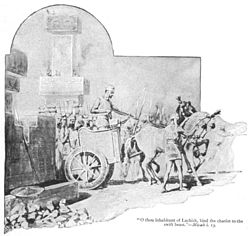Micah 2
Appearance
| Micah 2 | |
|---|---|
 An illustration of Micah 1:13: "O thou inhabitant of Lachish, bind the chariot to the swift beast." (www.ordination.org). | |
| Book | Book of Micah |
| Category | Nevi'im |
| Christian Bible part | Old Testament |
| Order in the Christian part | 33 |
Micah 2 is the second chapter of the Book of Micah in the Hebrew Bible or the Old Testament of the Christian Bible.[1][2] This book contains the prophecies spoken by the prophet Micah, and is a part of the Book of the Twelve Minor Prophets.[3][4]
Text
- The original text is written in Hebrew language.
- This chapter is divided into 13 verses.
Textual versions
Some most ancient manuscripts containing this chapter in Hebrew language:
- Masoretic Text (10th century)
- Dead Sea Scrolls: (2nd century BC)[5][6]
Ancient translations in Koine Greek:
- Septuagint (3rd century BC)
- Dead Sea Scrolls: (2nd century BC)[5]
- Naḥal Ḥever (8ḤevXIIgr): extant: verses 7-8[5]
- Theodotion version (~AD 180)
Structure
NKJV groups this chapter into:
- Micah 2:1–5 = Woe to Evildoers
- Micah 2:6–11 = Lying Prophets
- Micah 2:12–13 = Israel Restored
Verse 13
The breaker is come up before them:
they have broken up,
and have passed through the gate,
and are gone out by it:
and their king shall pass before them,
and the Lord on the head of them.[7]
- "The breaker": it is best to interpret "the breaker" of Christ himself; and it is explained by the Jews also,[8] to whom this and all the rest of the characters in the text agree; and who may be so called with respect to his incarnation, being the firstborn that opened the womb, and broke forth into the world in a very extraordinary manner; his birth being of a virgin, who was so both before and after the birth; thus Pharez had his name, which is from the same root, and is of a similar sound with Phorez here, from his breaking forth before his brother, unawares, and contrary to expectation, Genesis 38:29.[9]
- "The breaker is come (gone) up before them": Micah depicts Israel's redemption under the figure of release from captivity. The passage is clearly Messianic, and can neither be considered an interpolation nor tortured into a declaration of the siege and ruin of Samaria or Jerusalem.[10]
- "Passed through the gate": They "break through," not to enter in but to "pass through the gate and go forth." The wall of the city is ordinarily broken through, in order to make an entrance Psalm 80:13; Psalm 89:41; Isaiah 5:5; Nehemiah 2:13, or to secure to a conqueror the power of entering in Proverbs 25:28; 2 Kings 14:13; 2 Chronicles 25:23; 2 Chronicles 26:6 at any time, or by age and decay 2 Chronicles 32:5. But here the object is expressed, to go forth. Plainly then, they were confined before, as in a prison; and the gate of the prison was burst open, to set them free.[11]
- "their king": "the Breaker," peculiarly "their king" (Hosea 3:5; Matthew 27:37).[12]
See also
- Related Bible parts: Isaiah 30, 1 Corinthians 5
Notes and references
- ^ Collins 2014.
- ^ Hayes 2015.
- ^ Metzger, Bruce M., et al. The Oxford Companion to the Bible. New York: Oxford University Press, 1993.
- ^ Keck, Leander E. 1996. The New Interpreter's Bible: Volume: VII. Nashville: Abingdon.
- ^ a b c d e Dead sea scrolls - Micah
- ^ Timothy A. J. Jull; Douglas J. Donahue; Magen Broshi; Emanuel Tov (1995). "Radiocarbon Dating of Scrolls and Linen Fragments from the Judean Desert". Radiocarbon. 38 (1): 14. Retrieved 26 November 2014.
- ^ Micah 2:13
- ^ In Mattanot Cehunah in Bereshit Rabba, parash. 85. fol. 75. 2. Vid. Galatia. Arcan. Cathol. Ver. l. 3. c. 30.
- ^ John Gill. John Gill's Exposition of the Entire Bible. Exposition of the Old and New Testament. Published in 1746-1763.
 This article incorporates text from this source, which is in the public domain.
This article incorporates text from this source, which is in the public domain.
- ^ Joseph S. Exell; Henry Donald Maurice Spence-Jones (Editors). The Pulpit Commentary. 23 volumes. First publication: 1890.
 This article incorporates text from this source, which is in the public domain.
This article incorporates text from this source, which is in the public domain.
- ^ Barnes, Albert. Notes on the Old Testament. London, Blackie & Son, 1884. Reprint, Grand Rapids: Baker Books, 1998.
 This article incorporates text from this source, which is in the public domain.
This article incorporates text from this source, which is in the public domain.
- ^ Robert Jamieson, Andrew Robert Fausset; David Brown. Jamieson, Fausset, and Brown's Commentary On the Whole Bible. 1871.
 This article incorporates text from this source, which is in the public domain.
This article incorporates text from this source, which is in the public domain.
Bibliography
- Collins, John J. (2014). Introduction to the Hebrew Scriptures. Fortress Press.
{{cite book}}: Invalid|ref=harv(help) - Hayes, Christine (2015). Introduction to the Bible. Yale University Press.
{{cite book}}: Invalid|ref=harv(help)
